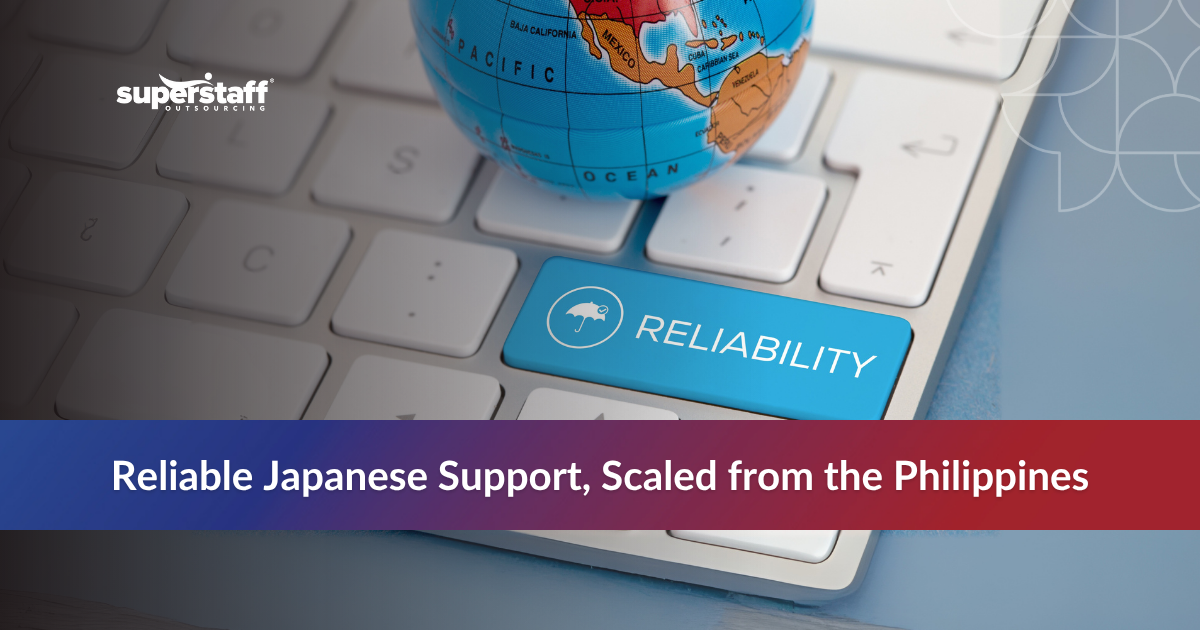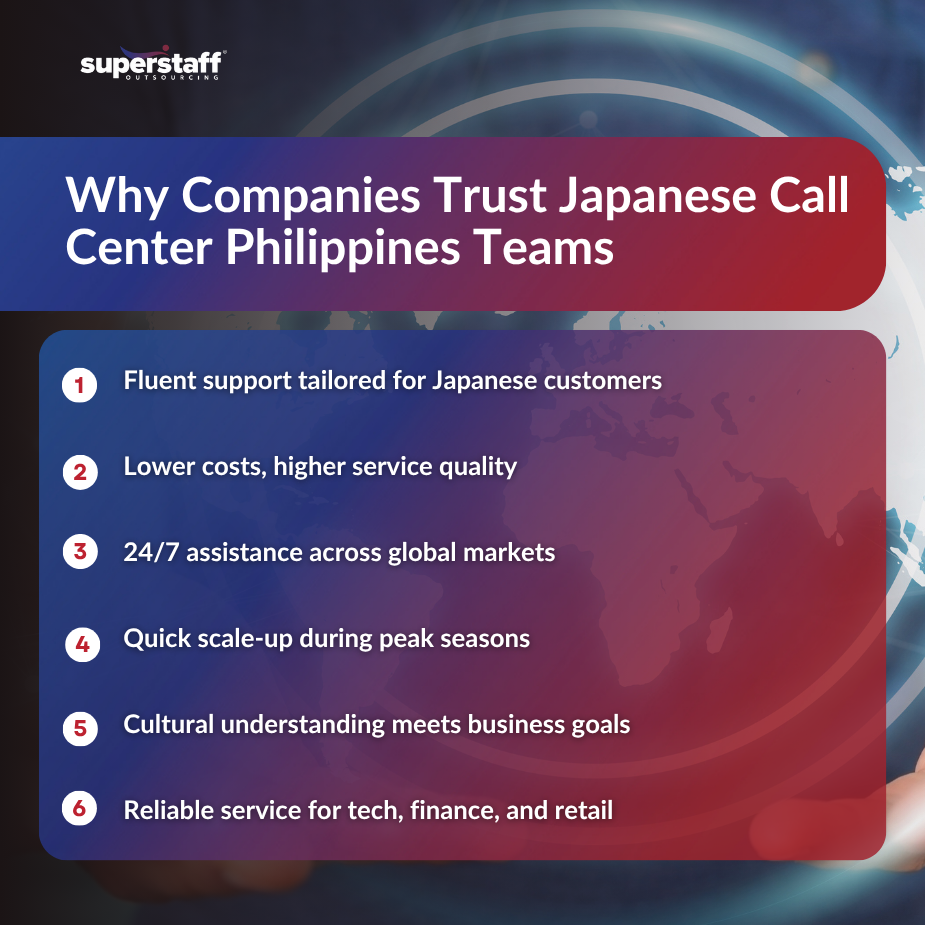
Many global companies are now expanding their customer service to better support Japanese-speaking clients. Whether it’s an e-commerce platform, a travel site, or a fintech app, offering high-quality Japanese customer support is becoming a key part of business growth. But hiring and training Japanese-speaking staff in-house can take time and cost a lot.
That’s why more businesses choose to outsource to the Philippines. With a growing pool of trained bilingual talent, the Philippines has become a trusted destination for Japanese-language customer service. This article explores how Japanese call center Philippines services help companies stay competitive, serve more markets, and provide customer support that matches the expectations of Japanese users.

Why Japanese Support Is in High Demand
More companies are serving Japanese-speaking customers across Asia and beyond. These customers expect helpful, polite, and efficient service in their native language. Failing to meet those expectations can lead to poor experiences and lost trust.
1. Large and Loyal Customer Base
Japan has a strong and loyal consumer market. People are known for their high standards when it comes to customer service. Providing support in Japanese helps businesses win their trust and keep them coming back.
2. Service Expectations Are High
Politeness and clear explanations are important in Japanese culture. A mistake in communication, especially when dealing with money or personal information, can hurt a brand’s reputation.
3. In-House Hiring Takes Time
Finding fluent Japanese speakers in some regions can be slow and expensive. Companies also need to train new hires in their tools, products, and policies.
4. Need for 24/7 Support
Many businesses want to offer support beyond Japanese working hours. Having teams in the Philippines makes it easier to provide round-the-clock help without overloading local teams.
5. Growing Regional Demand
Japanese-speaking customers are not only in Japan. Many live in countries like Thailand, Singapore, or the U.S. Expanding support to cover all these users is easier with outsourced teams.
Why the Philippines Is a Top Choice
The Japanese call center Philippines model has become a reliable solution for companies across different industries. From tech startups to global brands, many turn to the Philippines for strong multilingual support.
1. Skilled Japanese-Speaking Workforce
The Philippines has a rising number of professionals fluent in Japanese, many of whom have studied or worked in Japan. These agents understand the language, culture, and work standards expected in Japanese service.
2. Strong Customer Service Training
Call centers in the Philippines have a long history of delivering quality service. Agents are trained in both technical support and customer care, making them flexible for different types of tasks.
3. Lower Costs
One of the top benefits of Japanese-speaking call center agents in the Philippines is cost efficiency. Companies can access quality service without the high salaries and office expenses found in Japan.
4. Cultural Compatibility
Filipino service agents are known for their politeness and patience. These traits align well with the Japanese way of doing business, making interactions smooth and respectful.
5. Government Support for BPO
The Philippine government continues to invest in the BPO industry. This includes offering training programs, language courses, and tax support for companies that choose to outsource to the Philippines.
Tasks Handled by Japanese Call Center Philippines Teams
Japanese-speaking call center teams in the Philippines are trained to handle a variety of customer support functions.
1. General Customer Support
Agents can answer questions about orders, products, or services in Japanese. This includes helping users with account settings, refunds, or updates.
2. E-commerce Assistance
For online shopping platforms, agents manage order confirmations, tracking updates, returns, and product questions. They make sure users understand each step clearly.
3. Technical Troubleshooting
When users experience app errors, login issues, or device problems, bilingual support teams walk them through the solution. Clear communication is key in these situations.
4. Travel and Booking Services
Japanese customers booking flights or hotels often need help with changes, cancellations, or upgrades. Support agents explain all terms and guide users through options.
5. Banking and Financial Support
Agents can explain fees, interest rates, or payment schedules in Japanese. This is especially important in sectors where accuracy and trust matter most.
Key Benefits for Businesses
Japanese call center Philippines services bring more than just language skills. They help businesses operate more smoothly and build long-term customer relationships.
1. Save Time and Money
Instead of setting up a full team from scratch, companies can use an existing outsourced service with ready-to-work agents.
2. Scale Fast
During product launches or marketing campaigns, call volume can increase. Outsourced teams can grow or adjust quickly to meet demand.
3. Improve Quality
With training in Japanese culture, etiquette, and industry terms, agents deliver service that feels familiar and respectful to the customer.
4. Cover All Time Zones
Japanese-speaking support teams in the Philippines can provide help during both business hours and off-hours. This reduces wait times for customers.
5. Support Business Expansion
Companies planning to grow in Japan or serve Japanese-speaking clients globally can rely on call center teams to support new users right away.
Best Practices When Outsourcing Japanese Support
A strong outsourcing setup depends on clear plans, smart provider choices, and ongoing collaboration.
1. Choose a Provider With Language Experience
Work with a company that has trained Japanese-speaking agents and experience with Japanese clients. This ensures quality right from the start.
2. Review Service Needs
Check how many calls, emails, or chats are expected and what types of questions users may ask. This helps in setting the right team size and training needs.
3. Provide Tools and Guidelines
Make sure agents have access to product details, manuals, and support scripts in both Japanese and English. This helps them answer correctly and efficiently.
4. Track Quality Metrics
Use feedback forms, call reviews, and resolution rates to make sure the support team continues to meet expectations.
5. Keep Communication Open
Regular check-ins with your outsourcing partner help spot issues early and make quick improvements. It also helps the team feel part of your brand.
Expand Japanese Service Without the Overhead
Outsourcing Japanese-language customer support can give your business the flexibility and reach it needs. The Japanese call center Philippines model allows companies to serve users clearly, respectfully, and efficiently, without the high costs of setting up an in-house team in Japan.
SuperStaff provides multilingual call center services tailored for businesses entering or expanding in Japanese markets. Our trained bilingual agents support onboarding, orders, refunds, and technical help across multiple industries. We offer the tools, language skills, and experience needed to keep your Japanese-speaking customers satisfied.
If your business is ready to scale with quality service in Japanese, outsource to the Philippines with a trusted partner. With SuperStaff, you gain a professional, reliable, and flexible team that helps you grow across borders, without compromising customer experience.
Let SuperStaff help you build your next Japanese support team.






